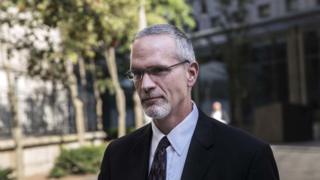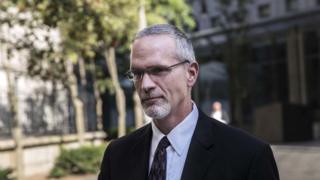‘I’m being jailed – but the court was misled’
Two former traders were convicted despite multiple misleading statements by prosecutors. …

 Image copyright Getty Images
Image copyright Getty Images The UK’s top financial watchdog made statements for use in court that were later acknowledged by a senior official to be false, the BBC has discovered.
The statements were used in a case against two ex-Deutsche Bank traders convicted of rigging interest rates.
US government prosecutors submitted other statements that were acknowledged in court to be false or misleading.
Both the US and UK authorities said allegations of misconduct have been dismissed by the court.
‘Win at all costs’
Matt Connolly, 54, from Basking Ridge, New Jersey and Gavin Black, 49, from Twickenham, Middlesex are the latest in a line of former traders to face jail for conspiring to make money for their banks and themselves by manipulating Libor, the benchmark interest rate that tracks the cost of borrowing cash.
Thirty former traders have been prosecuted over four years by the US Department of Justice (DoJ) and the Serious Fraud Office, accused of taking part in fraud conspiracies to rig rates.
But critics of the rate-rigging trials doubt the safety of the convictions. More have been acquitted than convicted as juries decided the evidence did not show criminality.
Speaking to the BBC, Matt Connolly said: “The Department of Justice in the US gets to make up its own story and owns the rules.
“I was mistaken in thinking it was a search for the truth. It is really ‘win at all costs’ for the DoJ. The truth has become secondary to the result. That saddens me. I want the truth.”
Statements from the UK’s Financial Conduct Authority (FCA) were used by the DoJ to try to fight off allegations that the government had violated the US constitution, which threatened to collapse the case.
Under the 5th Amendment it is unlawful in US criminal proceedings to use evidence that has been compelled, such as information from a witness who risks losing their job or going to jail if they do not co-operate.
If compelled evidence is seen by investigators or witnesses, defendants can apply for a hearing, known as a “Kastigar hearing”, to get the case thrown out.
That created difficulties for DoJ prosecutors. For six years, they had communicated regularly with the FCA, which made extensive use of a power to force witnesses to be interviewed on pain of going to jail.
When Connolly and Black pressed for a Kastigar hearing, the DoJ told the court: “The DoJ and these agencies [including the FCA] did not share paperwork”.
They added: “What evidence the DoJ independently collected, it did not share with the FCA”.
Months later, evidence emerged showing the DoJ had shared paperwork with the FCA in 2015 and also shared reports of interviews of Deutsche Bank staff in 2014 and 2016.
Email trail
On 31 August 2017, the DoJ again opposed a Kastigar hearing, citing a letter written the previous day by Patrick Meaney, a senior FCA manager. Mr Meaney ran the FCA’s investigation into Deutsche Bank Libor “rigging” for nearly six years, collaborating with his DoJ counterpart, Jennifer Saulino.
In paragraph 6 of the letter, Mr Meaney said: “The FCA did not share any information obtained or derived from any compelled interview, including Mr Black, with the DoJ.”
Paragraph 5 of his letter said: “The FCA did not provide the DoJ copies of its draft or actual Warning, Decision or Final Notices in respect of Deutsche Bank to the DoJ or the Commodities Futures Trading Commission (“CFTC”)”.
Neither statement was true. It was not until months after Mr Meaney’s letter that emails conflicting with those statements emerged in court.
They included an email chain Mr Meaney was copied into in February-March 2015, where the FCA shared a portion of its Final Notice fining Deutsche Bank for Libor rigging with the CFTC.
The email chain showed sections to be forwarded to the DoJ contained compelled testimony. They were then forwarded to Jennifer Saulino.
On 21 April 2015, Mr Meaney told Ms Saulino by email the Final Notice was riddled with compelled testimony.
“The reality is… it would be very difficult to identify parts that weren’t influenced by compelled testimony and even if we could, it would be such a small part that it would make the Notice meaningless.”
Shown the emails in court, an FCA official on the Deutsche Bank Libor investigation, Mike Prange, accepted the statements in Mr Meaney’s August 2017 letter were “false”.
The emails were available to both the FCA and the DoJ on their email records at the time the statements were put into court.
Future of the case
Patrick Meaney left the FCA in December 2017 to become head of enforcement at the Dubai Financial Services Authority.
His lawyers said he had not reviewed his emails at the time; the statements were a mistake, corrected in a sworn declaration of December 2017.
However, after the Kastigar hearing in April 2018 where the emails were raised, the FCA had to write to the court again to correct the record.
At court, Chief Judge Colleen McMahon repeatedly accused the DoJ of submitting lies or misleading statements, in one instance adding: “You should be ashamed of yourselves.”
Judge McMahon nevertheless decided the trial should go ahead. In October 2018, a New York jury convicted Connolly and Black. The two will be sentenced later this month.
Connolly has now decided to go public to protest against his conviction even though it risks bringing him more time in jail, publishing a book, promoting a website and giving an interview to the BBC.
In May 2019, Judge McMahon refused an application to have the convictions overturned due to prosecutor misconduct.
The DoJ told the BBC: “These allegations are nothing more than a re-hashing of arguments raised before, during and after the trial, and each time the court has denied the defendants’ motions regarding allegations of prosecutorial misconduct.”
Jennifer Saulino also referred to the same decision dismissing concerns about prosecutor misconduct.
The FCA referred to the same judgment, saying criticism had been based on a misreading of the trial.
“The US court’s decision followed a hearing in which all the evidence was reviewed. Given that the matter is still subject to ongoing legal proceedings, we do not consider it appropriate to comment further.”
Andy Verity’s interview with Matt Connolly for World Business Report can be heard on the BBC World Service, available here from 3.30pm GMT.



